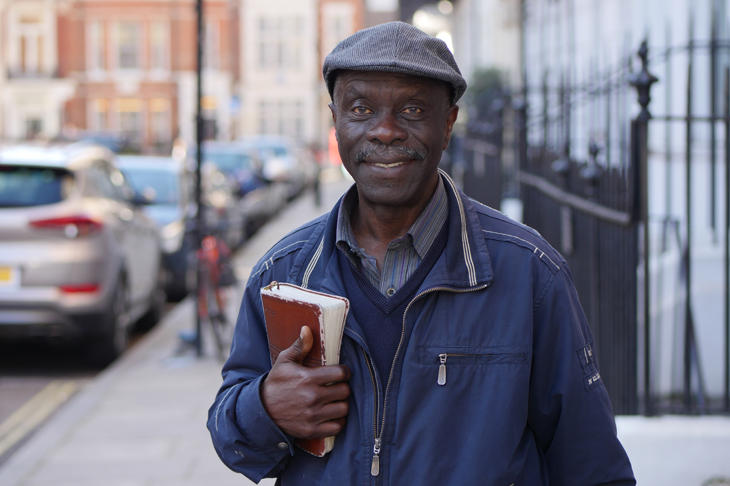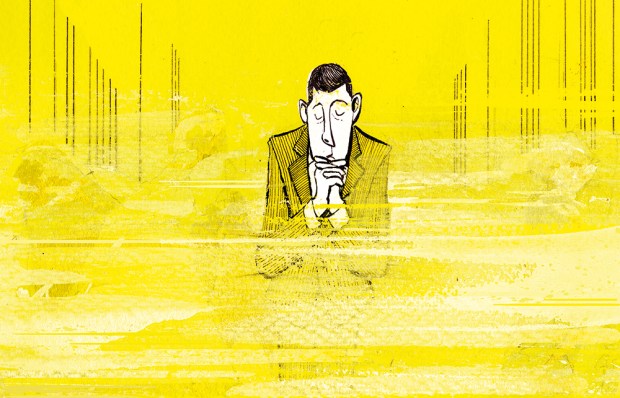Being a street preacher can be a thankless business. Since moving to Britain from Nigeria nine years ago, 64-year-old Oluwole Ilesanmi has toured the country reading aloud from the Bible, spending hours outside train stations, urging people to see the light. Sometimes he makes a convert; most of the time his preaching falls on deaf ears. Last month, it resulted in him being arrested.
Saturday 23 February began like a typical day for Ilesanmi. He went to Southgate tube station in north London and preached for a few hours. His spiel included a disobliging reference to Islam, which seemed to rile a passer-by. To Ilesanmi’s surprise he was then accosted by the man. A woman who filmed the incident says she feared Ilesanmi was about to be attacked: ‘The man had his forehead to the preacher’s forehead. He looked like he was about to knock him out.’
It seemed that Ilesanmi was the victim. But he was accused of Islamophobia, and then the police arrived. The video — since viewed millions of times online — shows what happened next. Ilesanmi was arrested, handcuffed and one of the officers snatched his Bible away. When Ilesanmi objected, the policeman responded by saying: ‘You should have thought about that before being racist.’
‘When they took the Bible off me I felt so enraged,’ Ilesanmi tells me. ‘They couldn’t do that to the Koran. They dare not do that to the Koran. The policeman wanted to even throw the Bible on the floor.’
A Christian preacher this afternoon was arrested at Southgate station London N14 for preaching about Jesus . @CConcern the police told him it’s because public had said he was being islamophobic . We have the full video and wondered when preaching was now illegal ? @Campaign4T pic.twitter.com/ZxC1DhlZCf
— EyeOnAntisemitism (@AntisemitismEye) February 23, 2019
That was just the beginning of his humiliation. He was then bundled into a police car and driven off. When he asked where he was being taken, he was told: ‘Somewhere where you can’t get back to preach.’ That turned out to be Wrotham Park, five miles away on the outskirts of London, where the cops let him out of their car. ‘De-arrested’, the police later called it. Ilesanmi, without any cash, was at a loss as to how to get home until an elderly man took pity on him and paid for a bus ticket.
It’s a strange story. What crime did Ilesanmi commit? The police said that: ‘Once it became apparent that he would not return…no further action was taken against him.’ So no law was being broken. But in that case, why did the police cart him off in cuffs and dump him miles away?
Ilesanmi admits to calling Islam an ‘aberration’ and referring to Allah as an ‘idol’ but the law here is clear: street preachers have a clearly stated right to talk freely about their beliefs in public. Article nine of the Human Rights Act states that: ‘Everyone has the right… to manifest his religion or belief, in worship, teaching, practice and observance.’ A change to the Public Order Act in 2014 further strengthened the right of Christians — and others — to preach. The law now says that the police should only intervene if someone is purposefully trying to harass people and is using ‘threatening or abusive words’. It is clear that Ilesanmi wasn’t.
So again, why was he arrested? Acting Superintendent Neil Billany said of the Ilesanmi incident: ‘The Met respects and upholds the rights of all individuals to practise freedom of speech and this includes street preachers of all religions and backgrounds. However, if the language someone uses is perceived as being a potential hate crime, it is only right that we investigate.’
But Ilesanmi says his message is one of ‘peace’: ‘What the Bible tells me is what I have to tell them. The love of people is in my mind. What happens to us after we die is what endears me to tell people the truth.’ He found the accusation of racism particularly hard to take. ‘I have never been racist and I never will be,’ he says. ‘A racist is someone who doesn’t like other human beings and God has taught me love. I can never be a racist.’
All this fits a trend. In June 2017, two Christian street preachers, Michael Overd and Michael Stockwell, criticised Islam during the course of their sermon in a shopping centre in Bristol and were convicted of a religiously aggravated public order offence. A judge later overruled their conviction and said he was ‘conscious of the right of freedom of speech and freedom of expression’.
Christian Concern, an organisation that stepped in to help Ilesanmi, says it has a 100 per cent track record of getting street preachers acquitted, which suggests that the police are misusing the law. The policeman who arrested Ilesanmi told him he was ‘disturbing people’s days’. When he mentioned Jesus, he was told ‘no one wants to listen to that’. Is that really for the police to decide?
Ilesanmi has not been put off by what happened to him. In fact, he did return later that same day to Southgate station and read from his Bible once again. ‘I went back to go and preach. And I preached for two good hours, hoping that these police would come back. They never came,’ he says. His arrest was humiliating, he tells me. ‘No one goes in handcuffs without it being painful. The police were vicious.’ He wants an apology for what happened to him. Will he get one? It seems unlikely.
Depressingly, it is not clear that the police have learnt any lessons from what happened in Southgate. Of course it’s a difficult balancing act — one man’s hate crime is another man’s religious freedom. What’s more, a spokesman for the Met said that the law and guidance on street preaching is ‘not that specific’. It remains a fact, however, that the police often become involved when they shouldn’t.
Certainly most street preachers are eccentric. But a threat? Ilesanmi simply wants to talk about Christianity. He just wants to give people an ‘understanding’ of the gospel, he says. And as he points out, he isn’t making anyone listen to him. ‘If you don’t want to hear, close your ears.’
Got something to add? Join the discussion and comment below.
Get 10 issues for just $10
Subscribe to The Spectator Australia today for the next 10 magazine issues, plus full online access, for just $10.
You might disagree with half of it, but you’ll enjoy reading all of it. Try your first month for free, then just $2 a week for the remainder of your first year.














Comments
Don't miss out
Join the conversation with other Spectator Australia readers. Subscribe to leave a comment.
SUBSCRIBEAlready a subscriber? Log in